Air France-KLM Bundle
Can Air France-KLM Soar to New Heights?
The aviation sector is constantly evolving, and Air France-KLM, a major player in the Air France-KLM SWOT Analysis, must navigate this dynamic landscape. This Franco-Dutch airline group, born from a strategic merger, has a rich history and a global footprint. Understanding Air France-KLM's journey and future trajectory is crucial for anyone interested in the airline industry.
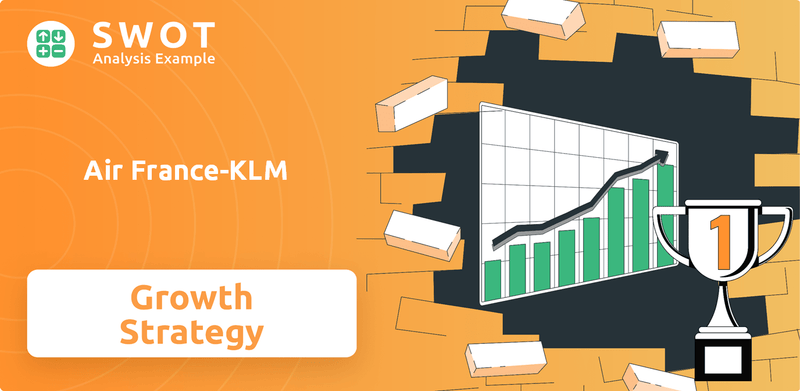
This article delves into Air France-KLM's growth strategy and examines its future prospects within the competitive airline industry. We'll explore their expansion plans 2024, analyze their financial performance review, and assess their position within the European aviation market. By examining their strategic planning and initiatives, we aim to provide a comprehensive Air France-KLM company analysis.
How Is Air France-KLM Expanding Its Reach?
Air France-KLM's growth strategy is built on strategic expansion, focusing on network optimization, fleet modernization, and targeted partnerships. The group is actively pursuing increased capacity and market share in key regions, especially North America and Asia, through joint ventures and codeshare agreements. These moves aim to capture growing passenger traffic and diversify revenue streams.
The enhanced transatlantic joint venture with Delta Air Lines and Virgin Atlantic is a key part of this strategy, allowing for coordinated flight schedules and shared revenue. This collaboration is crucial for expanding their reach. Also, they are investing in new routes and increasing frequencies to high-demand destinations, which is crucial for their growth.
In terms of fleet expansion and modernization, Air France-KLM is committed to acquiring more fuel-efficient and environmentally friendly aircraft, such as the Airbus A350 and Boeing 787. This commitment not only reduces operational costs but also improves the customer experience and aligns with sustainability goals. This modernization is a continuous process, with new aircraft deliveries planned through 2030. Furthermore, the group is exploring opportunities in new business models, such as the development of its low-cost subsidiary Transavia, to cater to different market segments and remain competitive against budget airlines.
Air France-KLM is focused on strategically expanding its route network, particularly in high-growth markets. This includes adding new routes and increasing flight frequencies to popular destinations to cater to growing passenger demand. The group is also optimizing its existing network to improve connectivity and operational efficiency.
A key element of the Air France-KLM company analysis is fleet modernization. The group is investing in newer, more fuel-efficient aircraft like the Airbus A350 and Boeing 787 to reduce operating costs and environmental impact. This includes plans for continuous fleet renewal with deliveries scheduled through 2030.
Air France-KLM leverages strategic partnerships and joint ventures to expand its global reach and market share. The enhanced transatlantic joint venture with Delta Air Lines and Virgin Atlantic is a prime example. These collaborations allow for coordinated flight schedules, shared revenue, and enhanced customer benefits.
The group is exploring opportunities in new business models, such as the development of its low-cost subsidiary Transavia, to cater to different market segments and remain competitive against budget airlines. This strategy allows Air France-KLM to capture a broader customer base and adapt to evolving industry trends.
Air France-KLM's expansion plans for 2024 and beyond include significant investments in fleet renewal, route network expansion, and strategic partnerships. These initiatives are designed to boost passenger growth and improve financial performance.
- Increased capacity on key routes, particularly to North America and Asia.
- Continued fleet modernization with the acquisition of fuel-efficient aircraft.
- Enhanced joint ventures to strengthen market presence and revenue sharing.
- Development of Transavia to capture the low-cost market segment.
Air France-KLM SWOT Analysis
- Complete SWOT Breakdown
- Fully Customizable
- Editable in Excel & Word
- Professional Formatting
- Investor-Ready Format
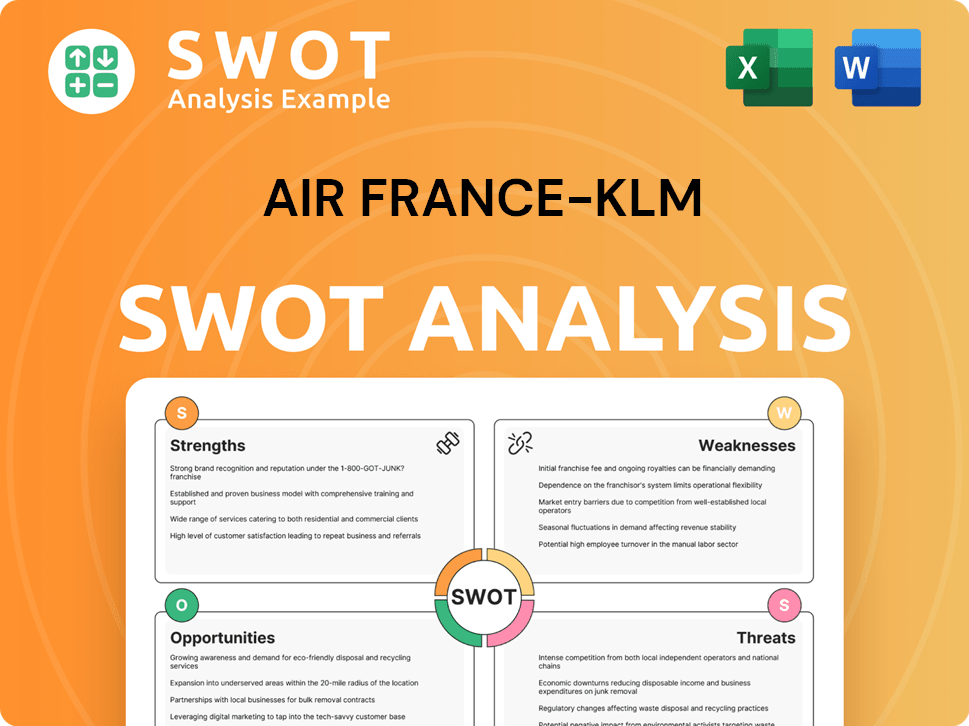
How Does Air France-KLM Invest in Innovation?
Air France-KLM is heavily invested in innovation and technology as a core part of its growth strategy. These advancements are designed to boost its competitive edge within the airline industry. The company's digital transformation efforts are central to improving the customer journey, from booking to post-flight services.
The company is using artificial intelligence (AI) and data analytics to personalize offers and dynamically adjust pricing. This leads to greater operational efficiency and reduces disruptions. Automation is also being implemented across various operations, such as baggage handling and check-in processes, to streamline workflows.
Air France-KLM is also exploring sustainable aviation fuels (SAF) and hydrogen-powered aircraft. This demonstrates a commitment to decarbonizing the aviation industry. The group is also investing in research and development for advanced MRO techniques.
Air France-KLM is focusing on digital transformation to improve the customer experience. This includes enhancing online booking, check-in processes, and in-flight entertainment. The goal is to create a seamless and personalized journey for passengers.
The airline is using AI and data analytics to optimize flight paths and fuel consumption. This leads to cost savings and environmental benefits. Personalized offers and dynamic pricing are also being implemented.
Air France-KLM is actively exploring the use of sustainable aviation fuels (SAF). This is part of its commitment to reduce carbon emissions. SAFs are seen as a key element in the future of aviation.
The company is investing in research and development of hydrogen-powered aircraft. This technology has the potential to significantly reduce the environmental impact of air travel. This is part of their long-term sustainability strategy.
Air France-KLM is investing in advanced Maintenance, Repair, and Overhaul (MRO) techniques. This includes using data analytics for predictive maintenance. This helps to reduce downtime and improve operational efficiency.
The group is fostering a culture of open innovation by collaborating with external innovators and startups. This allows them to integrate new solutions rapidly. These partnerships are crucial for staying ahead in the competitive landscape.
These technological advancements contribute directly to growth objectives by enhancing operational performance, improving customer satisfaction, and fostering environmental responsibility. The Target Market of Air France-KLM benefits from these improvements. Air France-KLM's strategic focus on innovation and technology positions it as a forward-thinking leader in the aviation sector, aiming to achieve its long-term strategic goals. In 2024, Air France-KLM's investments in digital transformation and sustainable technologies are expected to increase, contributing to the company's strategic planning and future prospects.
Air France-KLM is implementing several key technological initiatives to drive growth and improve efficiency. These initiatives are focused on enhancing the customer experience, optimizing operations, and reducing environmental impact.
- Digitalization of customer services, including AI-powered chatbots and personalized travel recommendations.
- Implementation of AI for predictive maintenance, reducing aircraft downtime by up to 20%.
- Expansion of SAF usage, aiming for a 10% SAF blend by 2030.
- Development of hydrogen-powered aircraft technologies, with potential for commercial deployment by the late 2030s.
- Strategic partnerships with tech startups to accelerate innovation in areas like data analytics and sustainable aviation solutions.
Air France-KLM PESTLE Analysis
- Covers All 6 PESTLE Categories
- No Research Needed – Save Hours of Work
- Built by Experts, Trusted by Consultants
- Instant Download, Ready to Use
- 100% Editable, Fully Customizable
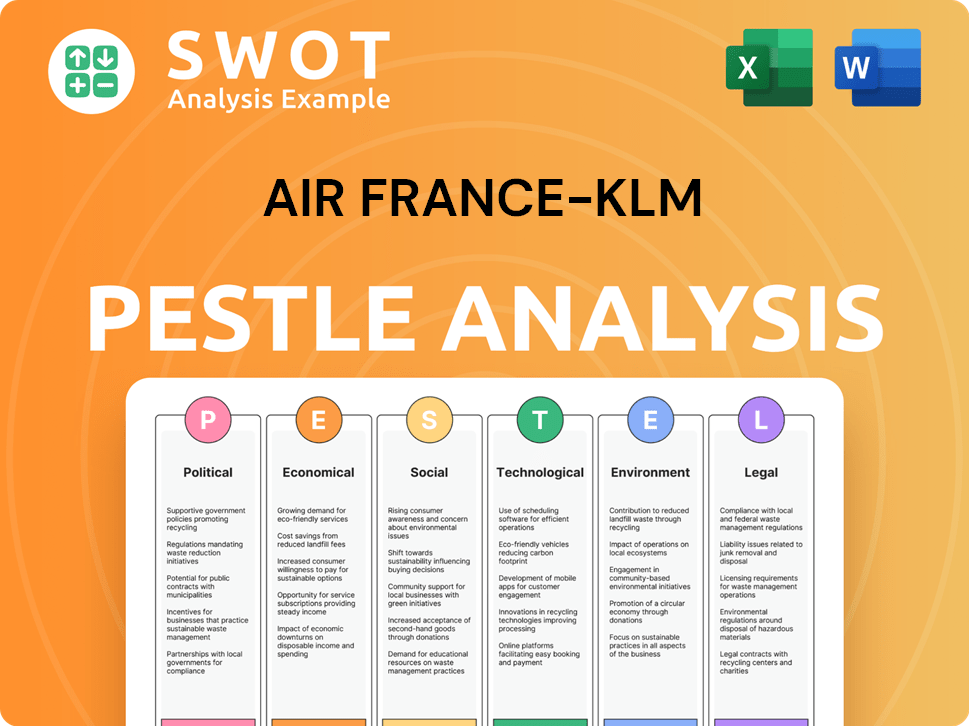
What Is Air France-KLM’s Growth Forecast?
The financial outlook for Air France-KLM is centered on achieving sustainable profitability and strengthening its financial position. The company's Air France-KLM growth strategy focuses on increasing revenue through higher passenger numbers, optimized pricing, and expansion in cargo and maintenance, repair, and overhaul (MRO) services. This approach is designed to capitalize on the recovery in air travel demand and improve operational efficiency.
Air France-KLM aims to maintain a positive trajectory, building on the progress made in recent years. This involves a disciplined approach to capital allocation, ensuring investments support long-term value creation and sustainable growth. The group's financial goals are underpinned by strategic initiatives to navigate the challenges and opportunities within the airline industry.
The company's financial strategy also includes a commitment to reducing its net debt and enhancing its balance sheet. This is crucial for ensuring financial stability and supporting future investments. The focus on financial discipline is a key element of the company's long-term strategy, contributing to its resilience and ability to adapt to market changes. The Air France-KLM company analysis shows a clear path towards sustained financial health.
Air France-KLM anticipates continued revenue growth, driven by increased passenger traffic and optimized pricing. The expansion of cargo and MRO activities also contributes to revenue generation. These strategies are integral to the Air France-KLM future prospects.
For the full year 2024, the group targets an operating margin between 2.5% and 3.5%. This reflects the company's efforts to improve profitability and operational efficiency. This target is a key indicator of the company's financial health.
The group reported a net income of €934 million for the full year 2023, demonstrating its recovery and financial resilience. This significant improvement over previous years underscores the effectiveness of its strategic initiatives. This financial performance is a testament to the company's recovery.
Capital expenditures are projected to be around €2.5 billion annually for the coming years. These investments are primarily allocated to fleet renewal and digital transformation projects. These investments are crucial for the company's long-term growth.
Net debt stood at €4.8 billion at the end of 2023, with a target to further decrease it in the medium term. This commitment to debt reduction is a key part of the company's financial strategy. Reducing debt is essential for financial stability.
Analyst forecasts generally indicate a positive trajectory for the group, anticipating continued recovery in air travel demand. The benefits of ongoing cost-saving measures are also expected to contribute positively. These forecasts support the group's strategic goals.
Air France-KLM's financial strategy is built on several key pillars, including revenue growth, cost management, and capital discipline. These elements are crucial for achieving the company's long-term goals. The company's strategic planning is designed to ensure sustained success.
- Increase profitability through optimized pricing and operational efficiency.
- Reduce net debt to strengthen the balance sheet.
- Invest in fleet renewal and digital transformation to improve competitiveness.
- Focus on Air France-KLM expansion plans 2024 through strategic partnerships and route network optimization.
For more insights into the company's values and mission, consider reading about the Mission, Vision & Core Values of Air France-KLM.
Air France-KLM Business Model Canvas
- Complete 9-Block Business Model Canvas
- Effortlessly Communicate Your Business Strategy
- Investor-Ready BMC Format
- 100% Editable and Customizable
- Clear and Structured Layout
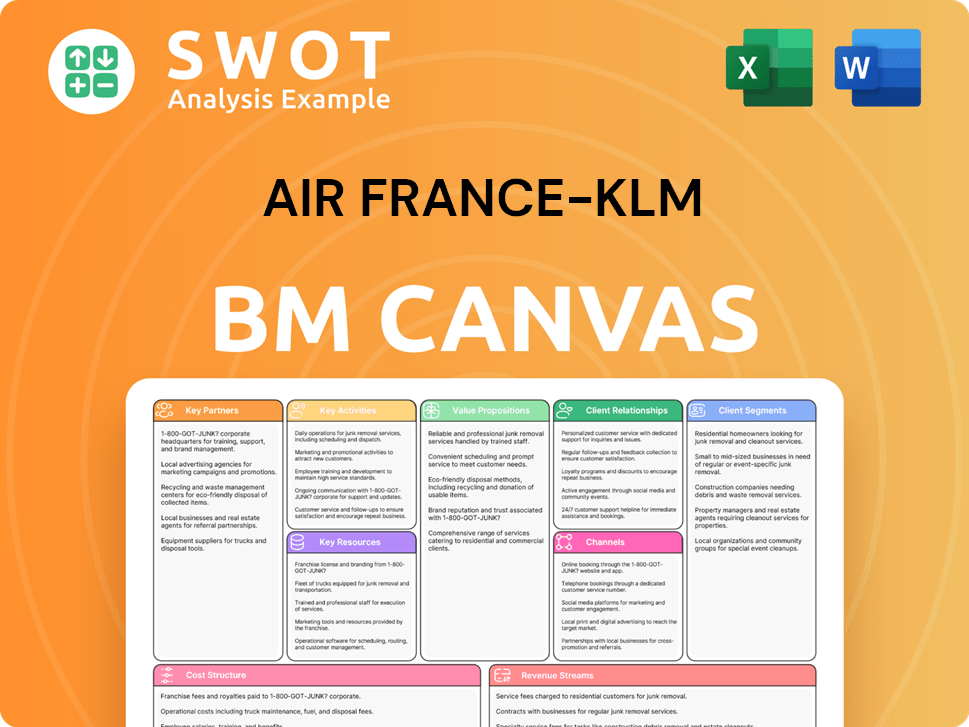
What Risks Could Slow Air France-KLM’s Growth?
Air France-KLM faces a complex landscape of potential risks and obstacles that could impact its Air France-KLM growth strategy and overall performance. The airline industry is inherently volatile, influenced by economic cycles, geopolitical events, and evolving consumer preferences. Understanding these challenges is crucial for assessing the Air France-KLM future prospects and developing effective strategic planning.
Intense competition from both established and low-cost carriers puts constant pressure on pricing and service innovation. Regulatory changes, especially those related to environmental policies, add to operational costs and compliance burdens. Furthermore, the aviation sector is susceptible to unforeseen events, such as pandemics or regional conflicts, which can severely disrupt air travel demand and operational capabilities. These factors require the company to maintain robust risk management strategies.
Supply chain vulnerabilities and technological disruptions add further layers of complexity. Managing labor relations and attracting skilled personnel also pose ongoing challenges. To navigate these risks, Air France-KLM employs various strategies, including diversification of revenue streams and robust risk management frameworks. The company's resilience, as demonstrated during the COVID-19 pandemic, is a key factor in its ability to overcome obstacles and pursue its long-term goals.
The Air France-KLM competitive landscape includes both legacy carriers and low-cost airlines, intensifying the need for competitive pricing and service offerings. This competition can squeeze profit margins and require continuous innovation. The rise of low-cost carriers, in particular, has reshaped the market dynamics, forcing established airlines to adapt their strategies to remain competitive. For more insights, explore the Competitors Landscape of Air France-KLM.
Regulatory changes, particularly those related to environmental policies and carbon emissions, pose a substantial risk. This includes potential increases in operational costs and compliance burdens. The pressure for decarbonization and the need for investments in sustainable aviation fuels (SAF) are critical. According to recent reports, the industry faces significant financial implications if it fails to manage these environmental challenges effectively.
Geopolitical instability and economic downturns can significantly impact air travel demand and operational capabilities. Events such as regional conflicts or economic recessions can lead to reduced passenger numbers and operational disruptions. The aviation industry is highly sensitive to global economic trends, with economic downturns historically leading to decreased demand for air travel. The Air France-KLM expansion plans 2024 are subject to these external factors.
Supply chain vulnerabilities, especially concerning aircraft parts and SAF, could hinder fleet modernization and operational efficiency. Disruptions in the supply chain can lead to delays in aircraft maintenance and upgrades, increasing costs and impacting service reliability. Securing a stable supply of aircraft parts and SAF is crucial for maintaining operational efficiency and meeting sustainability targets. Addressing these vulnerabilities is critical for Air France-KLM financial performance review.
The rapid pace of technological innovation necessitates continuous investment to remain competitive. This includes advancements in aircraft technology, digital platforms, and operational efficiency. The company must continuously invest in new technologies to stay ahead of the competition. The aviation industry is undergoing a digital transformation, requiring airlines to adapt to new technologies to enhance customer experience and streamline operations. This affects the Air France-KLM digital transformation strategy.
Managing labor relations and attracting and retaining skilled personnel in a competitive market are ongoing challenges. Labor costs and workforce management are critical factors affecting profitability and operational efficiency. The aviation industry faces a shortage of skilled workers, including pilots, maintenance technicians, and ground staff. Addressing these internal challenges is vital for the Air France-KLM long-term strategic goals.
Fluctuations in fuel prices significantly affect the profitability of airlines. Rising fuel costs can increase operational expenses and reduce profit margins. Airlines often use hedging strategies to mitigate the impact of fuel price volatility. According to recent data, fuel costs can represent a significant percentage of an airline's operating expenses, making them a critical factor in financial performance. The Air France-KLM impact of fuel prices is a key consideration.
The aviation industry's recovery from the COVID-19 pandemic presents both challenges and opportunities. Demand for air travel has been gradually recovering, but the pace varies across different regions and routes. Airlines must adapt to changing passenger preferences and implement health and safety measures. The Air France-KLM post-pandemic recovery includes strategies to restore passenger confidence and optimize operations. The recovery trajectory is also influenced by the Air France-KLM route network strategy.
Air France-KLM Porter's Five Forces Analysis
- Covers All 5 Competitive Forces in Detail
- Structured for Consultants, Students, and Founders
- 100% Editable in Microsoft Word & Excel
- Instant Digital Download – Use Immediately
- Compatible with Mac & PC – Fully Unlocked
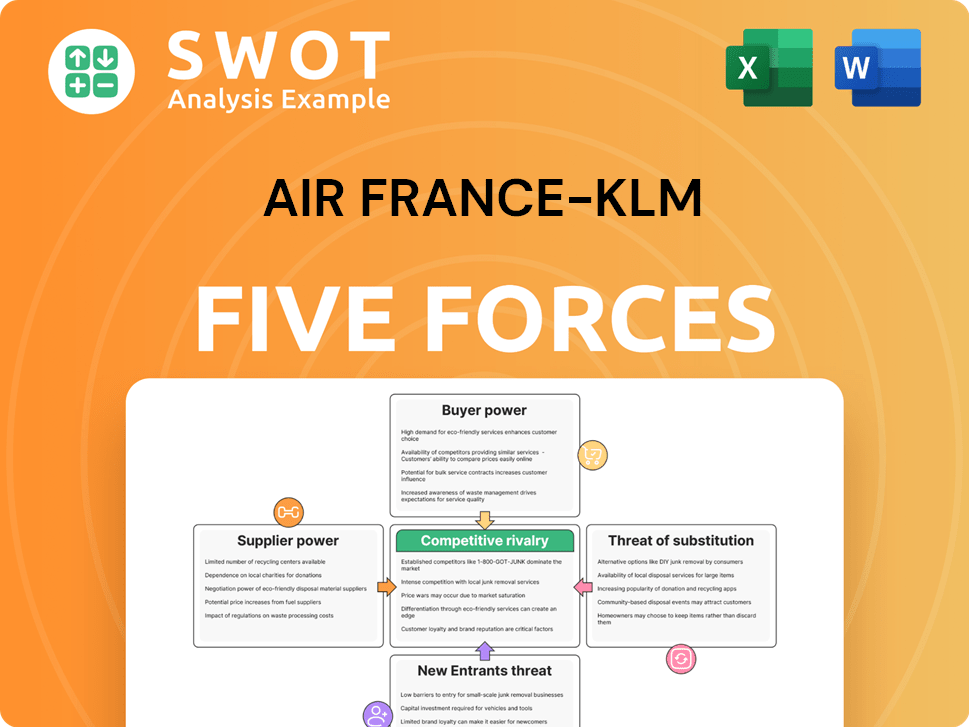
Related Blogs
- What are Mission Vision & Core Values of Air France-KLM Company?
- What is Competitive Landscape of Air France-KLM Company?
- How Does Air France-KLM Company Work?
- What is Sales and Marketing Strategy of Air France-KLM Company?
- What is Brief History of Air France-KLM Company?
- Who Owns Air France-KLM Company?
- What is Customer Demographics and Target Market of Air France-KLM Company?
Disclaimer
All information, articles, and product details provided on this website are for general informational and educational purposes only. We do not claim any ownership over, nor do we intend to infringe upon, any trademarks, copyrights, logos, brand names, or other intellectual property mentioned or depicted on this site. Such intellectual property remains the property of its respective owners, and any references here are made solely for identification or informational purposes, without implying any affiliation, endorsement, or partnership.
We make no representations or warranties, express or implied, regarding the accuracy, completeness, or suitability of any content or products presented. Nothing on this website should be construed as legal, tax, investment, financial, medical, or other professional advice. In addition, no part of this site—including articles or product references—constitutes a solicitation, recommendation, endorsement, advertisement, or offer to buy or sell any securities, franchises, or other financial instruments, particularly in jurisdictions where such activity would be unlawful.
All content is of a general nature and may not address the specific circumstances of any individual or entity. It is not a substitute for professional advice or services. Any actions you take based on the information provided here are strictly at your own risk. You accept full responsibility for any decisions or outcomes arising from your use of this website and agree to release us from any liability in connection with your use of, or reliance upon, the content or products found herein.